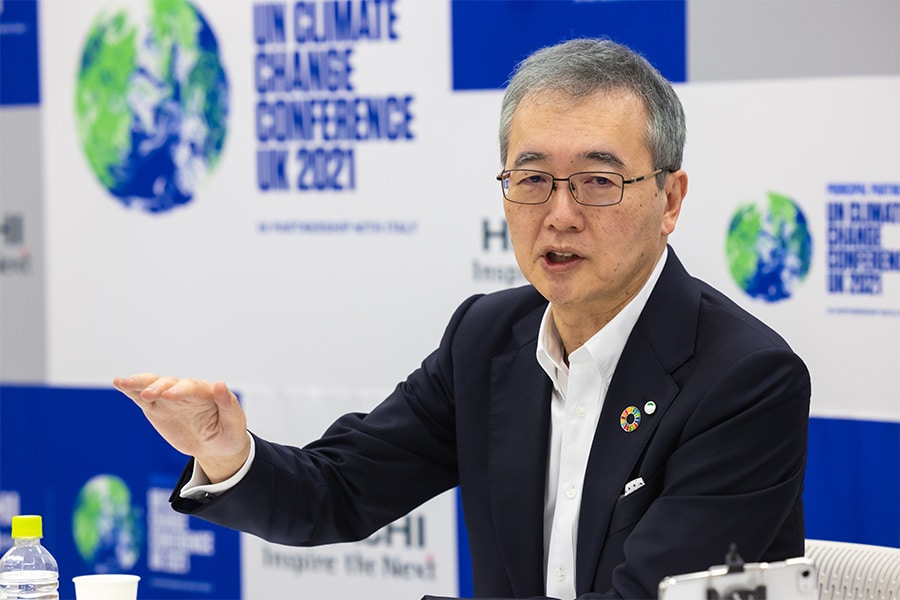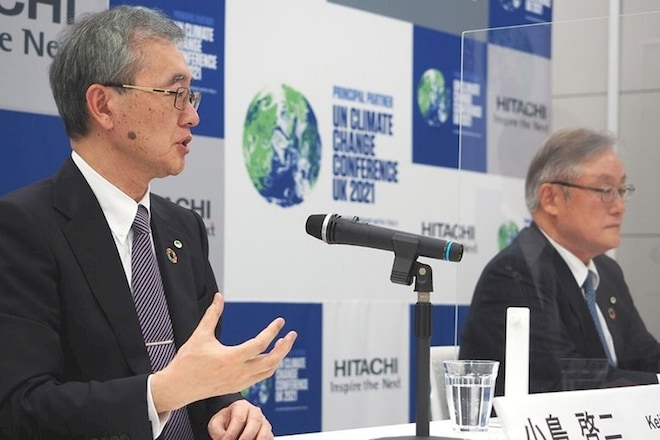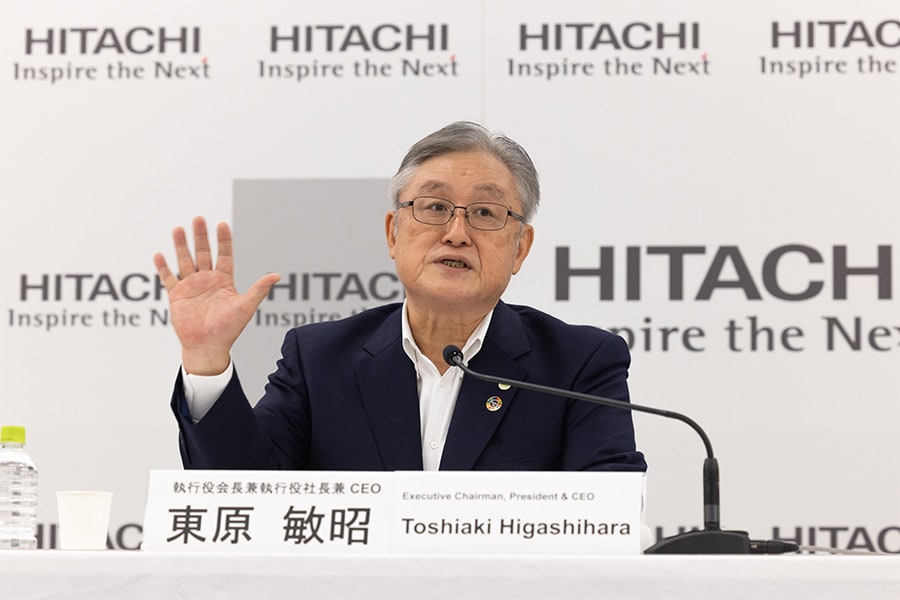Next is 10 years of growth: Hitachi's New President Keiji Kojima on his New Vision for Hitachi (Part 1)
Jul. 14, 2021
Ayano Onodera
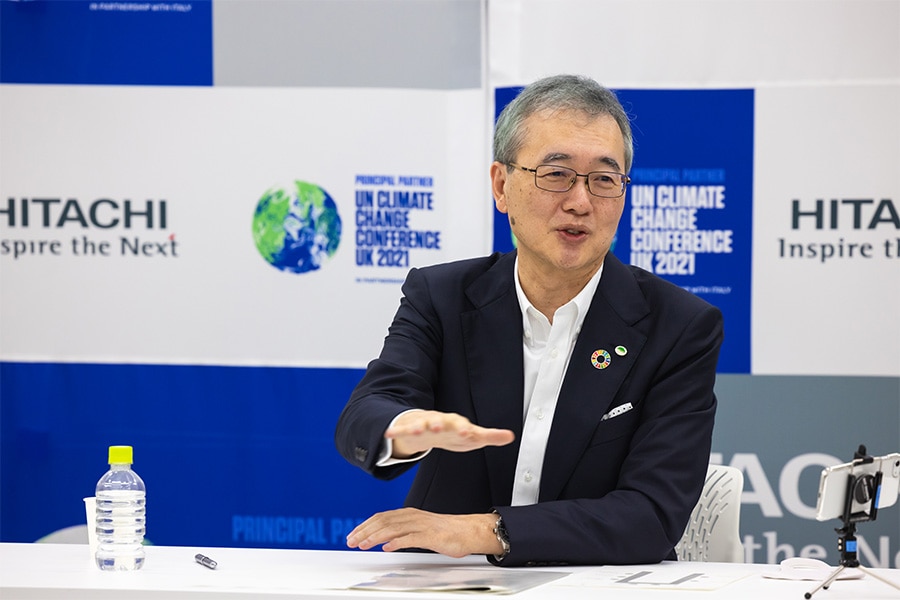
On June 24 and 25, 2021, Keiji Kojima, who has assumed the positions of President & COO of Hitachi, Ltd., spoke on his future management policy and vision in joint media interviews.
Since joining Hitachi in 1982, President Kojima has been involved in a wide range of research and development activities. Following terms as General Manager of the Central Research Laboratory and General Manager of the Hitachi Research Laboratory, in 2016 he became CEO of the Services & Platforms Business Unit. He was instrumental in the startup of Lumada, a proprietary digital solution platform that is a pillar of Hitachi's growth strategy.
Starting in 2019, as the head of the Life Sector, which is responsible for such businesses as healthcare and consumer electronics, he started replacing Hitachi's business portfolio, including such initiatives as the management integration of four automotive parts manufacturers and the making of Hitachi High-Tech Corporation into a wholly owned subsidiary. Following on these achievements, he assumed the post of president in June 2021. In parts 1 and 2 of this article, he discusses the kind of new vision that he is creating for Hitachi.
Creating a resilient company
--You have set forth an operating profit goal of 1 trillion yen (approximately USD $9 billion). How should we interpret this number?
Kojima: Since posting a large loss during the 2008 financial crisis, Hitachi has striven to rebuild its business and to achieve new growth. Thanks to the efforts of company presidents since then, our management base has gotten stronger, but due to the impact of COVID-19, our plan to generate adjusted operating profit margin of 7–8% fell to about 5%, and our forecast of 700–800 billion yen (approximately USD $6.3 - $7.2 billion) in profit dropped to about 500 billion yen (approximately USD $4.5 billion). However, not to be shaken by such adversity, we will generate solid profit of about 1 trillion yen. I see it as my job to promote Hitachi's growth into a resilient company.
To achieve this, we need to further increase our operating profit margin and improve our asset turnover ratio. We will also build a solid system that has multiple businesses of different characters so that, if one takes a hit, the others can cover for the damage. In addition, when something happens, operation speed and resilience are of crucial importance. So, my mentioning of a goal of 1 trillion yen is meant to express my desire of wanting to, in this way, create an extremely resilient company.
Applying past experience to achieve Hitachi growth
--Please tell us about a management-related experience that left an impression.
Kojima: During my time in R&D, I worked as an officer at a Silicon Valley startup. This gave me the opportunity to experience the thrill of on-the-edge management situations when you are dealing with the question of how much money is left in your bank account. Technological development was not our only pursuit. We had to make do with steadily decreasing funds just to stay employed. This was like riding a rollercoaster—both terrifying and fun. In my view, the people that see this as fun are the ones best-suited for management.
So if you want to know where your aptitude lies, you need to direct your vision outward. This will not happen if you simply keep looking within the company or research lab. For Hitachi's growth, it is now important for all employees to set their minds on growing. I want them to keep a view on the outside and to think about growth.
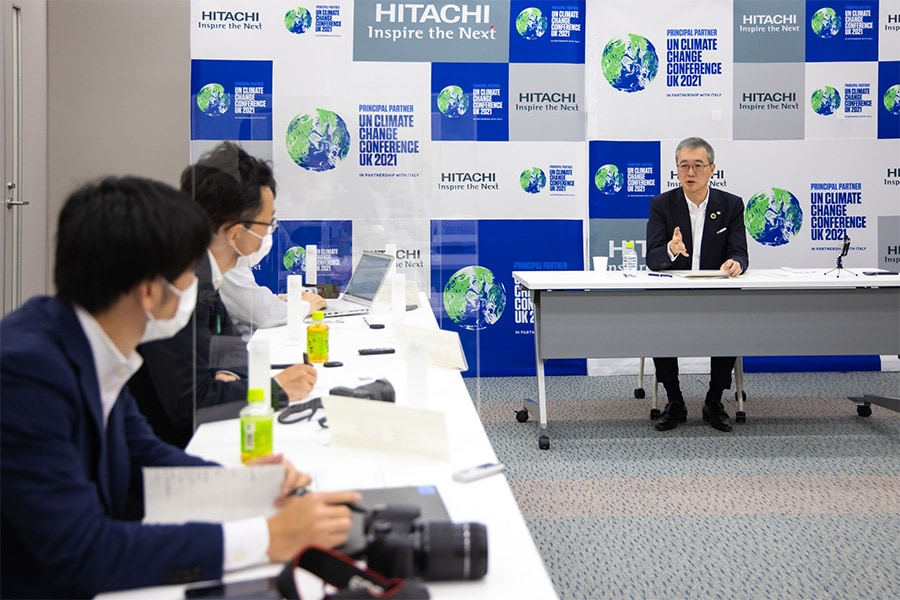
--From now on, how will you apply your experience to new management for Hitachi?
Kojima: I was in R&D for a long time, and I did IT-related research as no. 2 in command (as Head of the Information Service Research Center) at the Systems Development Research Laboratory. After that, I worked as General Manager at the Central Research Laboratory, where basic research is conducted, and also as general manager at the Hitachi Research Laboratory, which performs research into railways and other infrastructure technologies. In other words, I have been at the front lines in three different fields involving R&D, IT, basic research, and infrastructure technologies. Therefore, I think I can safely say that I know everything there is to know about Hitachi. I intend to apply this experience to Hitachi's future growth.
Going forward, I am convinced that only three types of companies will remain. The first type is the purely digital. These deal in only the areas of IT and cyber. The second type is the purely physical. These compete in the areas of materials and components. And the third type is the cyber-physical, which produces new innovation by combining digital with various products.
I want Hitachi to grow into a company that represents the cyber-physical. It unlikely that we will be able to find solutions to the many societal challenges that will come up in the future with just digital. The physical must also be involved. I want to see Hitachi grow as a company that finds solutions to societal challenges that involve both the physical and the digital realms.
The importance of intelligence
--What are your thoughts on the issue of economic security?
Kojima: There is no doubt that economic security has become a huge issue for markets and the entire world. We are heading into a future in which the economy must be considered from the perspective of security. I believe that this is also of critical importance to Hitachi and that it will be one of the themes of the next Mid-term Management Plan.
The strengthening of intelligence will be necessary for the future. This is because, without thorough knowledge of who is doing what in what country, it will be difficult to assess what kinds of risks could have a chance of manifesting themselves. With regard to Hitachi's various assets, I believe that we have to make solid assessments regarding what kinds of risks are generated by what kinds of events, as well as to control or minimize those risks.
For example, if decoupling, or the cutting of economic ties, occurs between the U.S. and China, it will be necessary to evaluate what impact this will have on Hitachi assets and to change our response in accordance. We are keeping constant watch on developments between the U.S. and China, and we are keeping track of the situation so that management can dodge any significant impact. But we have to keep a very careful eye on whether or not a decoupling actually occurs. Given this, I believe that intelligence will become extremely important.
Taking Hitachi into the growth phase
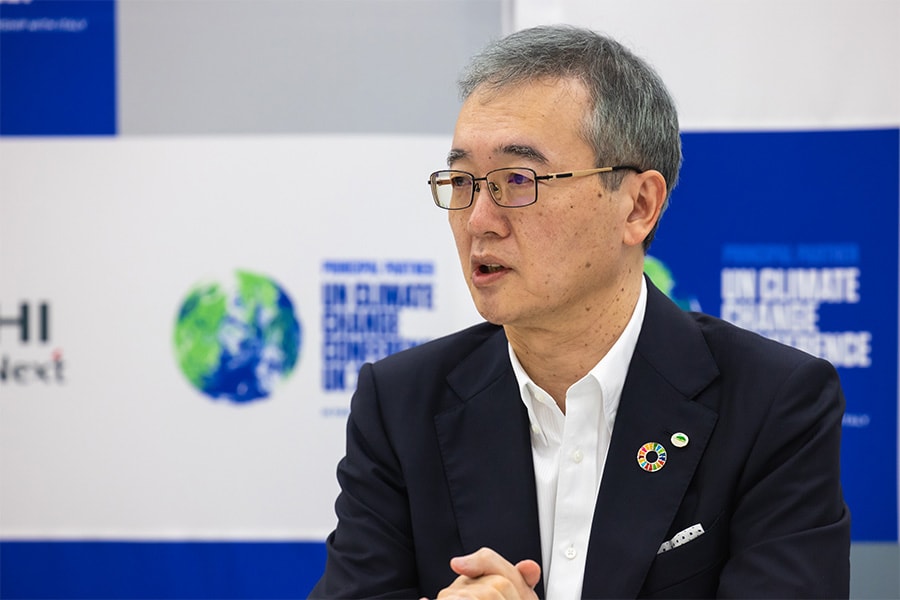
--Three presidents have led Hitachi since the descent into a managerial crisis following the 2008 financial crisis. What phase is Hitachi in now?
Kojima: The successive presidents all played different roles. The major task of Chairman Emeritus Takashi Kawamura , who was appointed president after the failure of Lehman Brothers, was to stop the bleeding. Chairman Emeritus Hiroaki Nakanishi* worked on recovery, clearly setting forth the next direction that Hitachi had to take—that of social innovation. Next, Chairman Toshiaki Higashihara , basing his actions on the idea that it was not possible to create subsequent growth without replacing the business portfolio, forcefully drove structural reform. I spoke of this in the past as "foundation work," which was what Chairman Higashihara's doing.
This had results. For example, behind the acquisition of ABB's power grid business was of course our expectation that the power grid business would, in this atmosphere of carbon neutrality, grow significantly in the future, but we also thought that getting ahold of ABB's global operating base would provide Hitachi with the groundwork for executing operations on a global basis. In this sense, this acquisition can be called "foundation work." The acquisition of the U.S.'s GlobalLogic was also foundation work because it gave us a foundation for expanding our IT business overseas and for innovating our domestic or overseas product businesses.
I believe that we have now reached a general conclusion to this foundation work. Next is 10 years of growth. We have stopped the bleeding, recovered, created foundations, and now it is the time for steady growth. I believe I was given the task of beginning this. My mission is to see how much I can turn over the big assets that I inherited and connect this to growth.
--You have been passed a heavy baton. What kind of mission are you holding onto?
Kojima: You are exactly right about it being a heavy baton, but at the same time, it is tremendously rewarding. Since I built the foundation for this together with the others, going forward we must use this as a basis for entering the growth phase. I believe that the skills that I have cultivated up to now will enhance my efforts to achieve this. The baton may be heavy, but I intend to grab and run with it with all that I have.
-
※Counselor Chairman Emeritus Nakanishi passed away from lymphoma after this interview on June 27, 2021.

